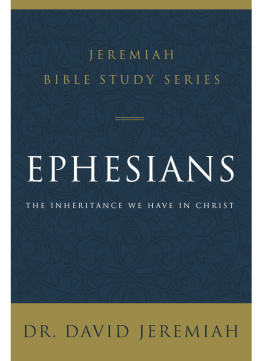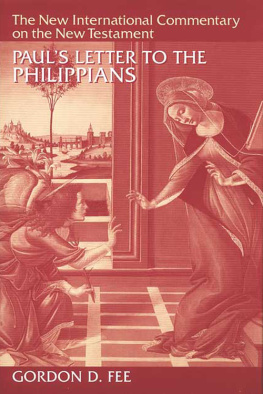

TO WARREN WIERSBE
Godly Example
Great Communicator
Gifted Writer
Good Friend

A s I was finishing this first book in the new Turning Point series, I thought of the many people who had encouraged me in this project. Dr. Merritt Barber , a dentist in our church, has many times expressed to me the hope that someday our Bible study material could be packaged for use in home Bible studies. When you are in a dental chair and your mouth is full of Novocain, you cant do much else but listen. I did!
For the last five years, every time I have seen Victor Books Mark Sweeney , he has reminded me that we ought to work on such a project together. We finally did it, Mark! Warren Wiersbe , who has given us the wonderful Be Series Bible studies, has urged me often to begin this process. As we shared a meal in Dayton, Tennessee, he finally convinced me that I should make this a priority.
My father, Dr. James T. Jeremiah , has consistently reminded me that writing should be a part of my life. My wife, Donna , has cheered me on when the pressures of our busy life made the completion of this assignment seem impossible. Paul Joiner added a whole new dimension to our study of Gods Word through his creative writing and directing of the dramatic sketches that correspond to each lesson. Glenda Parker , my administrative assistant, diligently protected my time for study and writing. My friends around the country tell me that she is the best gatekeeper they have ever met! Without her efforts, this book would not be a reality.
As I reflect upon all of these wonderful friends, I am drawn to the words that Paul used to express his love for the Philippian believers I thank my God upon every remembrance of you.
I n 1620 a ship left Plymouth, England, carrying the seeds of life as we know it in the United States today. But that voyage, as important as it was, cannot rival the one in AD 52, which embarked from Troas and sailed toward Neapolis.
The apostle Paul, his fellow preacher Silas, Luke the physician and writer, and Pauls disciple Timothy were aboard that vessel which brought the seeds of spiritual life to all of Europe and eventually the United States as well. Biblical scholars have called this the greatest event in history! For four thousand years, Asia had been the cradle of the human race; now that center was moving to Europe.
As Paul embarked on his second missionary journey, it was his hope to return to all the churches he had visited on his previous excursion. But according to Acts 16:67, he was forbidden to go north to Asia or northeast to Bithynia. While in Troas, the Lord spoke to Paul through a vision, in which he saw a man from Macedonia pleading with him to come over and help them. Pauls response is recorded by Luke: Now after he had seen the vision, immediately we sought to go to Macedonia, concluding that the Lord had called us to preach the gospel to them (16:10).
Paul and his company left Troas via the most direct route to the seaport of Neapolis and from there to the most important city in Macedonia, Philippi. Located about nine miles from the coast of the Aegean Sea, Philippi was a Roman colony and a flourishing, wealthy city. When Paul and his associates arrived there, they found no synagogue; but on the Sabbath they assembled at the riverside where worshippers had been gathering regularly for prayer. As the result of that first meeting, Lydia, a merchant-woman, was converted and baptized. In gratitude for what the Lord had done in her life, she offered her home as a place of lodging for the missionary team.
As soon as it became evident that the Lord was going to bless His Word, opposition developed. A demon-possessed slave girl began to follow the preachers and associate herself with them by loudly announcing their mission. Within a short time Paul cast the demon out of her, and she too was converted and made whole. The men who owned this girl, who were using her for their own gain, were furious. They seized Paul and Silas and had them beaten and thrown in jail. Locked in the inner prison, the two men were placed in stocks under secure guard. At midnight, as they were singing praises to God, an earthquake broke open the prison and freed all the prisoners from their bonds. The jailer, asleep in the adjoining house, heard the commotion and ran to the prison. Although the night was dark, he could see that the doors were opened and he concluded that the prisoners must have escaped. Rather than suffer shameful death, he decided to take his own life. He drew his sword to kill himself when Paul saw what was about to happen. He told the jailer not to harm himself, that they had not escaped! Because of this encounter, the jailer and all of his family were saved and baptized.
Ten years after the founding of the church in Philippi while Paul was a prisoner, he wrote to his Macedonian friends. Three times in his letter he expressed his gratitude for the gift they had sent to him by way of Epaphroditus. He had heard that they were concerned about him and he wished to encourage them. But he also had some corrective concerns. He knew that a spirit of division had developed among them and several times he admonished them to be unified. On six different occasions he referred to the coming Day of Christ, reminding them finally that the Lord is at hand (Phil. 4:5). He concluded his letter with encouraging words for their anxious hearts.
The theme of this letter is joy . The word rejoice is found nine times; the word joy five times; and the expression to rejoice with two times. Even though he was writing as a prisoner, Paul was filled with joy that permeates his letter. The secret of his joy was his relationship with Jesus Christ. The letter begins and ends with the name of Jesus. Forty times Paul mentions his beloved Saviors name, seventeen times in chapter 1 alone, which is an average of one citation in every two or three verses.
Paul saw himself as a slave of Christ. He referred to the Philippians as saints in Christ. He described his imprisonment as his bonds in Christ; and even though he knew that some were taking advantage of his imprisonment, he rejoiced that Christ was being preached. He had abandoned all things for the excellency of the knowledge of Jesus Christ, and he spoke of his life as to live is Christ. For the apostle, even death was defined as being with Christ.
As he admonished the congregation in Philippi to be unified, he expressed his hope that they would let this mind be in you which was also in Christ Jesus. Even his personal plans were expressed in relationship to his Lord. He trusted in the Lord Jesus to send Timothy to the Philippians, and he trusted in the Lord that he would be able to come to them himself.
He desired to win Christ and to know Christ, and he pointed to heaven from whence also he was looking for the Savior, the Lord Jesus Christ. He concluded his letter by expressing his desire that the grace of our Lord Jesus Christ would be with the Philippians.
The reason for Pauls joy was his relationship with Christ! As we study his Letter to the Philippians, we will observe the testing of that joy in the crucible of Roman imprisonment. If Pauls relationship to his Master could bring him joy under those conditions, then surely we who also love the Savior can learn to rejoice in our difficult times as well!
David Jeremiah
San Diego, California
1992
Paul and Timothy, bondservants of Jesus Christ, to all the saints in Christ Jesus who are in Philippi, with the bishops and deacons: Grace to you and peace from God our Father and the Lord Jesus Christ .
Next page


















